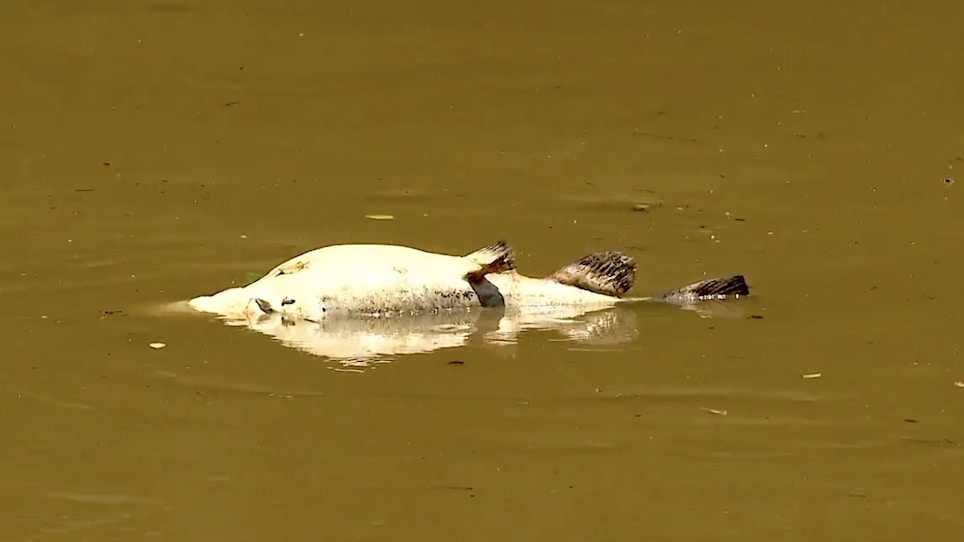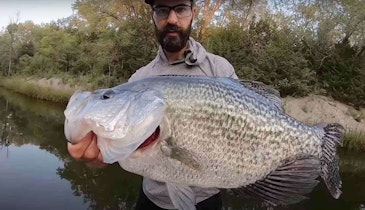
One of many dead fish seen floating in the Mulberry Fork River after a discharge of 800,000 gallons of wastewater from the Tyson Foods plant near Cullman, Alabama. (Photo: ABC 33/40)
Thousands of fish are dead after two massive sewage spills in three Alabama rivers, including one by a company fined in 2016 for a pollution issue.
Officials with the Alabama Department of Conservation and Natural Resources along with city, county and other state agencies are investigating how and why thousands of fish died.
In Athens, located in north Alabama, more than 3,000 fish were killed after a sewage spill from an old Pilgrim's Pride facility flowed into Swan Creek, a major tributary of the Tennessee River. Swan Creek is popular with anglers, hunters and recreational shooters at its public wildlife management area.
According to WAAY-31, the sewage spill occurred when a bag inside an old sewer line was not removed. The backup caused an overflow into the tributary that flowed into Swan Creek. Athens is cleaning the old chicken processing plant for other use.
Officials told the TV station that some of the fish killed included largemouth bass, sunfish, bullhead catfish and large-scale stonerollers. At leats 17 slackwater darters, a federally threatened species, also were killed.
About an hour south of there near Cullman, approximately 800,000 gallons of wastewater from the Tyson Farms Inc. River Valley Ingredients plant spilled into the Mulberry Fork River. Due to heavy rains the discharge moved into the Sipsey Fork River. Both rivers are among the most scenic in the area, used by many for fishing and other recreation activities.
The Alabama Department of Environmental Management released the following statement: The Department has conducted water quality testing downstream of the release. In addition, the Department has been in contact with the Alabama Department of Conservation and Natural Resources, which is assessing the extent of the fish kill, and will be providing its report to the Department. The Department has also been in contact with the facility regarding their response to the release. ADEM is in the process of gathering all of the information and reviewing the data that has been collected. Recent water quality data obtained by ADEM indicates that the dissolved oxygen has improved in Mulberry Fork since the release.
The agency was working with local city and county water treatment officials to ensure the drinking water was safe. Clean-up crews found E. coli levels in the river that were twice the safe amount allowed by the state health agency. Hundreds of fish were found floating or snagged in shoreline brush. Some local residents reported seeing crayfish and other aquatic animals crawling from the water or dead on the river banks.
Department of Conservation officials estimated 175,000 fish and animals were killed due to the spill. An official told al.com that so many fish were piled that a direct count was not possible.
The same facility, then operated by American Proteins, Inc., in 2016 was fined $19,000 for killing about 40,000 fish when 900 gallons of acid spilled into the Mulberry Fork River. Nelson Brooke with the Black Warrior Riverkeeper told ABC 33/40 News the facility "seems to have issues with infrastructure, maintenance and upkeep so they keep having these so called accidents. A $19,000 fine isn't even a slap on the wrist."
Tyson Foods said its latest spill was caused by pipe failure. In a released statement, the company said: "We deeply regret the incident on the Mulberry Fork, near Hanceville, Alabama. We are working to make things right, and have an environmental contractor onsite and in the waterways, actively working on clean-up and the collection of fish impacted by this incident. Our core values include serving as stewards of the environment — in Alabama and every community where we operate — and we take that obligation seriously. Our focus is to deal with the issue at hand, so it’s too early to speculate on our longer-term remediation efforts, but we want the community to know we will be considering several opportunities."





